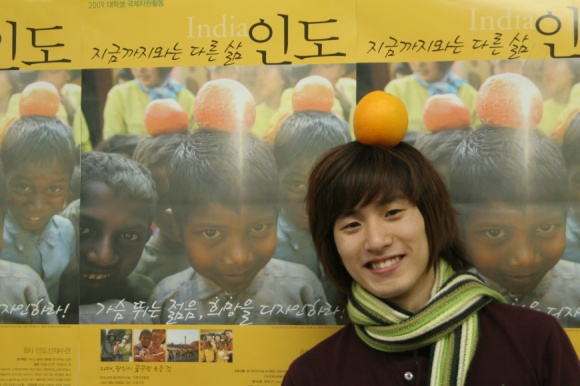Lee Yeon-sang, his affection towards volunteering

EVERY FRIDAY from 12:00 p.m. to 2:00 p.m., there is a person who sells "jjai tea" at a small table in front of Chunggyunggwan. He is Lee Yeon-sang (Soph., Dept. of Sociology). Although the price of the tea is only 500 and many people just go past him, Lee's "Little Jjai House" holds his dream of sharing love for making a new community and embracing all people regardless of their race or age.
Annals: What is the "Little Jjai House"?
Lee: "Little Jjai House" literally sells the traditional Indian tea, "jjai". Income from the selling is sent directly to the poor Indian children whom I met through the international volunteer work camp last year. We don't just send them money. We also provide them with oranges, which can prevent the children from being infected with tuberculosis or having skin problems.
What was your motive for starting the volunteer work?
The inspiration came from my high school life. I was interested in human rights, so I started a signature-seeking campaign for student rights, thinking that Korean students are definitely a minority group. That was because they cannot speak out about hair regulations or corporal punishment. Also, I tried to propose a student rights bill, searching for people who agreed with my thoughts. Through the activity, I gained interest in volunteer work for minorities and looked for something fruitful after entering Yonsei Univ. during the first winter vacation. Finally, I found an international volunteer camp that was combined with Buddhist meditation, so I joined last winter.
Tell us about your experience in India more specifically.
For 30 days, I did a Zen-Buddhist meditation in the morning and evening, and did volunteer work in the daytime. The village we visited was a very poor area where Dalit, people in the lowest class of their society, lived. The soil was so sterile that they could not even cultivate the basic foods. They earned less than ₩1,000 a day. The life of the residents was really desperate and it was hard for them to eat one meal a day. After finishing the morning worship, I visited the only kindergarten in the town, took care of the kids, planted trees, and fixed buildings and houses.
What did you learn and feel through the volunteer camp?
The No.1 motto of the camp was "Everything is an object to be learned." While doing volunteer works in India, I thought of myself being superior for a time. However, I realized that at a moment, I was learning from them. They gave us shelter, food, and the chance to sympathize with other people. As a result, I saw hope for a new community which I would like to make in the future in Korea. Contrary to the current Korean society where limitless competition prevails, I want to change this country into a place where people care for others' happiness and welfare. The change starts from me first, and will be spread to other people throughout the society.
* * *
This year he becomes a junior and dreams to be a teacher at an alternative school*. He says he wants to teach and take care of the students who are not protected by our society. His warmheartedness toward minority groups will heal the wounds of the world.
*Alternative school is a high school established to overcome the problems of the public education system such as cramming and authoritative teaching styles.

